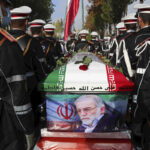
BAGHDAD (AP) — Iraq’s Parliament is set to hold a session Thursday to vote in replacements for 73 lawmakers who resigned earlier this month. The collective walkout by followers of Iraq’s most influential Shiite politician threw Iraq into further uncertainty, deepening a months-long political crisis over government formation.
It was not clear whether the extraordinary session requested by 50 members of parliament during a recess would go through. A simple majority of the legislature’s 329 members is required for an electoral session, and al-Sadr urged parliamentary blocs not to succumb to “pressures” from Iranian-backed factions.
Al-Sadr, a maverick politician with a large following, emerged as the biggest winner in general elections held in October, but has been unable to cobble together a coalition that can form a majority government.
He has been locked in a power struggle with internal Shiite rivals backed by Iran, preventing the formation of a new government.
Two weeks ago, he ordered lawmakers from his parliamentary bloc to resign in a bid to break the eight-month impasse. The unprecedented move threw Iraq’s political landscape into disarray.
According to Iraqi laws, if any seat in parliament becomes vacant, the candidate who obtains the second highest number of votes in their electoral district would replace them. In this case, it would make al-Sadr’s opponents from the so-called Coordination Framework, a coalition led by Iran-backed Shiite parties and their allies, the majority. This would allow pro-Iranian factions to determine the makeup of the next government.
Even though Parliament is in recess, lawmakers mostly from the Framework alliance called for an extraordinary session Thursday to vote on the new lawmakers.
On Wednesday, al-Sadr accused Iranian proxies of political meddling. He also accused them of applying pressure against newly elected political independents and allies of his Sadrist bloc.
He called on parliamentarians not to succumb to pressure.
“I call on blocs to stand bravely for the sake of reform and saving the nation, and not to give in to sectarian pressures, as they are bubbles which will disappear,” he said in a statement.
Munaf Al-Musawi, a political analyst and director of the Baghdad Center for Strategic Studies, said that the statement by al-Sadr against Iran’s proxies also sends a message to his former allies — Massoud Barzani of the Kurdistan Democratic Party, and Speaker of Parliament Mohammed Al-Halbusi — to avoid holding a parliament session.
He said if a session is held, the Coordination Framework and its allies would control parliament and Sadr’s allies would pay the price.
Iraq’s election was held several months earlier than expected, in response to mass protests that broke out in late 2019 and saw tens of thousands rally against endemic corruption, poor services and unemployment.
The political deadlock has led to concerns of renewed protests and street clashes between supporters of al-Sadr and their Shiite rivals.




